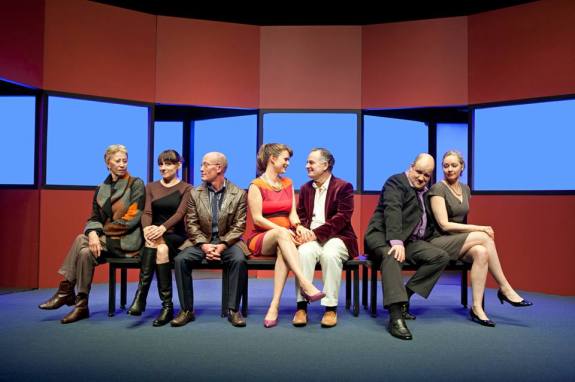When Dad Married Fury (Christine Harris and HIT Productions)
Gardens Theatre
March 7 – 8
David Williamson’s 2012 play “When Dad Married Fury” is safe theatre of the traditional kind. And there is nothing wrong with that. It is, as it promises to be, humorous and entertaining in that David Williamson way. Williamson realises that there is a reason why the drama of family dynamics features at the core of so much theatre and although this work is one centred around relatives and relationships, it is far from a toast to happy family life.
Brothers Ian (David James) and Ben (Drew Tingwell), along with their better halves, are gathered in Sydney to celebrate the 70th birthday of their recently widowed father, Alan (Denis Moore). Alan is a shonkie, but ruthlessly successful, businessman (worth about $100 million), but also a ‘sex-obsessed old bastard’ who has remarried an American woman known as Fury, who is half his age. Although they are yet to meet Fury, the men are convinced of her untrustworthiness and, as such, are keen to secure their intended inheritance.
Like the brothers, the audience must wait to meet the Fury of the title. We hear her described as a heaving-breasted former beauty queen, half Alan’s age, so expect a stereotype. When Annie Last finally takes stage as the larger than life title character, three-quarters of the way through Act One, she is actually quite engaging and personable…. until she begins discussing her narrow-minded, fundamentalist Christian beliefs and Tea Party allegiance, whereupon it appears that she’s a nutter.
But this is where things start to get interesting, not in terms of character relationships so much as the script’s detour into discussions of politics, religion and business. And although it is set in the aftermath of the 2007 financial crisis, there is still much of relevance within its subject matter, with sharp dialogue that is, for example, peppered with comments about the arts, artists and funding.
As arts academics from near-to-Byron-Bay (where the hills are alive with the sound of pottery wheels), Ben and particularly his wife Laura (Tanya Burne) are the moral oracle of the audience. Laura’s progressively more inebriated party interactions are a highlight, for her performance as much as the insightful accuracy of her social commentary. They epitomise the light-hearted nature of Act One, the levity of which is also reflected in the sharp lighting and simple set of coloured panels, allowing swift transitions and naturalistic use.
To a certain extent, Act Two subverts the stereotypical expectations established before interval as Williamson throws in some plot twists and starts to flesh out the stereotypes. In fact, it is soon apparent that these are not archetypes after all, but three-dimensional characters, with their own stories to tell for, as the dialogue reflects, there is no black and white in a world that no longer operates on handshakes and looking someone in the eye. Indeed, things unravel in Act Two as secrets are revealed and old wounds opened. Although the most interesting character is Fury, who emerges as not just a colourful character but a complex one, there is focus also on each brother’s marriage.
While “When Dad Married Fury” is, as it promises, a story of family relationships and greed, it is also a witty, well-paced exploration of the resoluteness of belief systems and ideologies in contemporary culture. And when it comes to a traditional theatre treat, you can rarely go wrong with a good dose of Williamson political and social satire.

